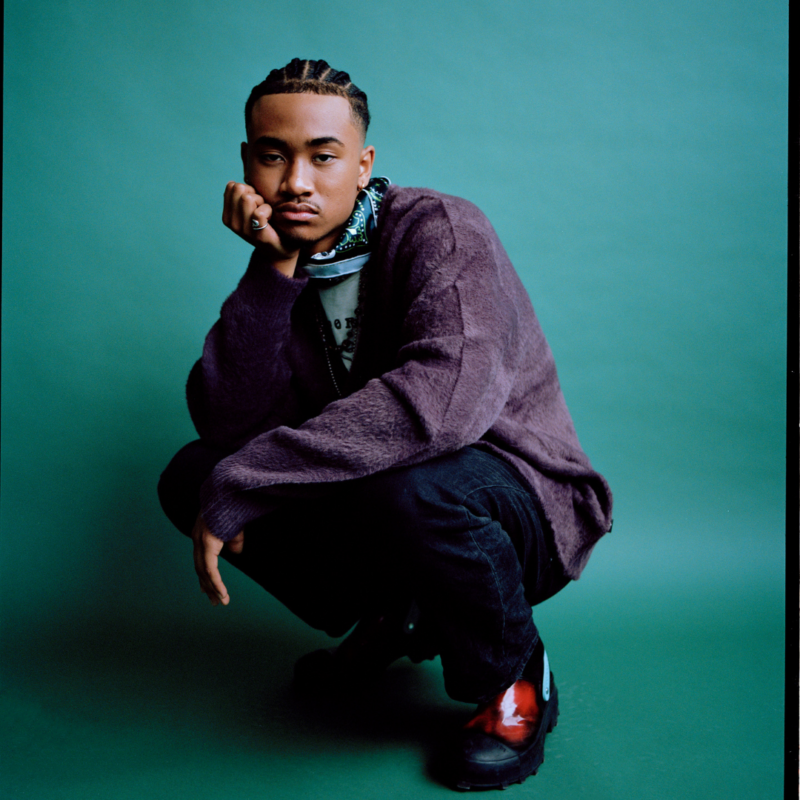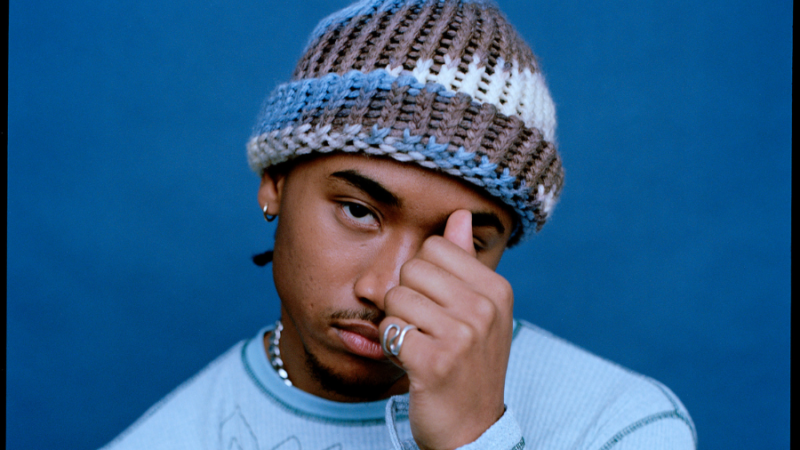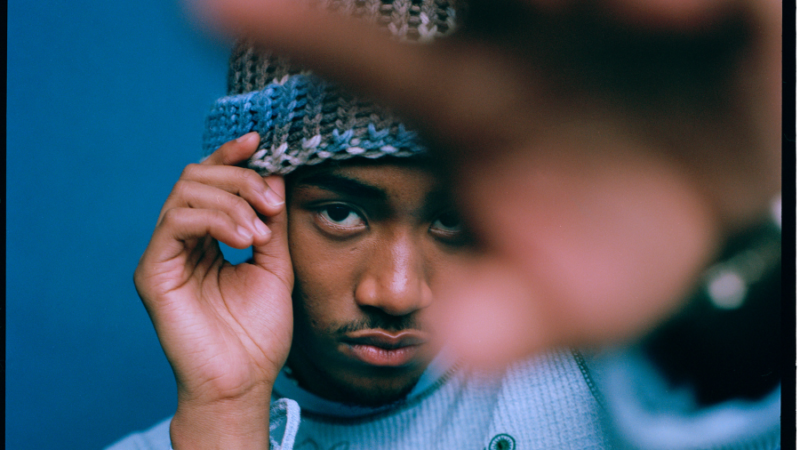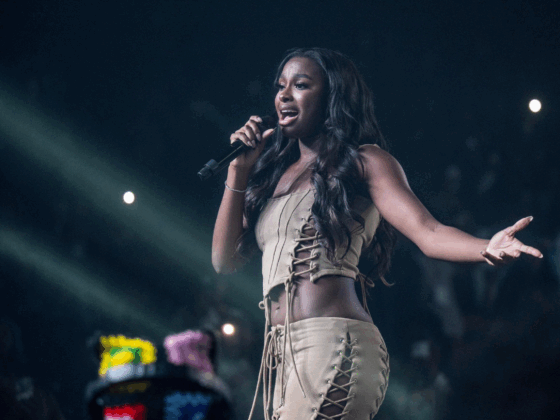
Oftentimes, it’s easy to think of musicians, athletes, entertainers, etc. as larger than life figures who have it all figured out. In reality, nothing could be further from the truth. Many of the public figures pictured in films, music videos and television series are young, talented and still getting a handle on all that is coming at them. Dylan Sinclair is no different. At 20 years old, he earned a Juno Award nomination, worked with Daniel Caesar, and has been featured in the world’s most prominent music outlets. Still, he’s a young adult with regular adult problems. He recently moved further into the city, juggles his personal life with his career and tries to make sense of it along the way. However, there is one thing that separates him from your average 20-year-old. When he decides to open up about his experiences as a young 20-something in Toronto, it sounds pretty damn good. Recently, Sinclair opened up about his recent move, interpersonal relationships, and developing a career on his new project, No Longer In The Suburbs. Upon its release, Dylan Sinclair chopped it up with Def Pen Culture Editor Ryan Shepard about his recording process, adjusting to life as a rising R&B star, and his reverence for early Usher and Chris Brown records.
Ryan Shepard: This is the first time that we’ve had an opportunity to speak to each other, so I just wanted to do a quick warm-up before we start talking about No Longer In The Suburbs. I know that you don’t often share a lot of your personal life on social media, but I did spend some time checking out your Twitter account while I was preparing for the interview. With that in mind, I wanted to try a quick exercise. I’ll give you a tweet and you can give me the backstory.
Dylan Sinclair: Sure, let’s get into it.
RS: In April, you tweeted, “Take yourself out on a date.” What made you say that?
DS: Take care of yourself. I believe in that very deeply. I’m trying to remember when I would have tweeted that. Actually, I might have been on a date with myself, but I just think that it’s important to take time alone. Personally, I like to take time to myself and think about things. As a creative, I feel like it’s important to slow down every once in a while when everything’s moving very quickly and spend time with yourself. Remind yourself with the things that you value and like to do. Read a book or do something that you enjoy. I’ve started going out to breakfast o my own and it just gave me this good feeling. People need to do more of the things that make them feel like that.
RS: I second that. At a previous job, I worked the overnight job and it was tough because I rarely got to see my friends during the week. So, I just started taking myself out to breakfast when I got off from my work and it boosted my mood a lot. However, that’s enough about me. The second tweet I picked out comes from March. You wrote, “I don’t get how people keep their shoes clean.”
DS: These are some good tweets. I don’t even remember when I said that. Facts! I get a new pair of shoes and I’m super excited to wear them, but I don’t want to get them dirty either. So, I’ll say, “I’m going to keep these clean.” Then, I’ll wear them like once every two months, but that’s no fun. I just like wearing my shoes. I like getting them a little bit dirty. I’m okay with it and I’m just accepting it. I’ve moved towards making sure the fit is proper, so the shoes don’t have to be the centerpiece.
RS: Definitely. I used to have that dilemma. I would buy these expensive sneakers and I’d want to wear them, but I also didn’t want to get them dirty. At a certain point, you just have to accept that they’re probably going to get messed up at some point. Moving on, I just have one more tweet. You sent this out on the same day as the previous tweet, actually. You wrote, “The goal is not to be famous. I’m not here to chase fans. They will find me. Simply tryna grow as an individual, remain curious, challenge perspective and have fun with it.” What made you tweet that?
DS: That’s how I felt. I still feel that way. Everything that happens in your life is a choice. So, I can decide to go whichever way I choose to with this music, but I just really want to have fun. I want to enjoy making new stuff that feels fresh and different. The only way I can do that is by living life in an interesting way. Then, I put the life into the music and people feel the music in a special way. That’s probably one of my favorite tweets. I actually re-read that yesterday. Going forward, I just want to re-read that to remind myself of what I want because it’s so easy to get caught up in certain things. People may want you to go this route instead of that route, but I’d rather just stay grounded and continue to chase whatever I set out to chase initially, which is making music. I love making music. I feel like was born to do it, so I just have to follow that path instead of living the superstar lifestyle with no music to back it up.

RS: I guess that’s a good place to start talking about your new project, No Longer In The Suburbs. In the past, the titles of your projects have always referenced a place that is important in your life. You have a project called Proverbs and you’ve talked about growing up in the church. You have a project called 3511 and it references the number of the apartment that you were living in at that point. No Longer In The Suburbs is the title of your most recent project. In your words, what does that title mean to you?
DS: Simply put, it’s about me moving from the suburbs into the city. On a deeper level, the title represents a lot to me. I had just dropped out of school. I didn’t really know what I was doing other than making music, but that couldn’t be my whole life. I was just sitting in the suburbs getting kind of bored, but I wanted more stimulation. I wanted to experience things, I wanted to mature, and I wanted to put myself out there and have fun with it. No Longer In The Suburbs is about me indulging in that curiosity, trying new things, seeing what I like, discovering what I don’t like, feeling real feelings, and meeting real people. That’s essentially what I was looking for by moving to the city and writing this project. That’s what I feel the music reflected.
RS: Speaking of the music, the one word that kept coming to mind when I was listening to the project is “change.” Throughout No Longer In The Suburbs, you talk a lot about changes within your interpersonal relationships and changes within yourself. At one point, you sing, “I hope I don’t change like the wind.” Having said that, what has been the best change you’ve experienced over the last few years and what has been the most difficult change you’ve experienced over the last few years?
DS: As I go through my experiences, the most valuable lesson I’ve learned is to be present and not worry about what the next person is doing. It’s important to stay focused on my own lane and live life the way that I want to live it. Those are probably the best gifts that God has given me during the process of making this project.
The worst change that I’ve honestly experienced…..I talked about it on the project and I simplified it by saying, “To be free is to feel the pain with no sense of fear.” I’ve had my struggles, but I’ve come to accept them as blessings and turn them into something beautiful. I’ve learned to confront anything that feels like a struggle as quickly as possible, so I can turn it into something positive.

RS: As you were talking, I thought about “Lifetime” from No Longer In The Suburbs and “Black Creek Drive” from 3511. Throughout “Black Creek Drive,” you talked about making the drive to see your significant other. On “Lifetime,” you talk about preparing your significant other and your friends for the changes that will come as your career progresses. What has been the most difficult part about preparing your family, friends, etc. for the changes that may come as your career develops?
DS: I think a lot of it is…you’ll only know it when you see it and when it’s really there in front of you. From my perspective, it has more to do with me remaining grounded. Yes, I’m working extra hard to make the best music that I can possibly make, but I still set out time to see my family and make sure that I make whoever I’m with feel special. Those things are very important to me because that’s still who I am at my core. I think that as long as I remain humble and focused on being my best self, the people around me will continue to grow with me. I think that’s at least what I choose to believe moving forward and we’ll see how it goes from there. I want to grow with the people around me and I want to love them, so they love me back. That’s how it works. The support is always very appreciated and I always try to show that love back.
RS: Speaking of the people that you’re growing up around, I saw your tweet about a song that you did with Savannah Ré recently. You’ve always talked about working with Daniel Caesar and Emmanuel. What has been like to watch your friends’ music grow as your music grows as well?
DS: I mean…it’s exactly as it is. You love seeing your friends win. It’s family. When you see people around you winning, it just makes you feel good. You are also the company that you keep, so it feels like a win for you as well.
RS: Wrapping up the more reflective part of the album, I wanted to circle back to the first time I heard your music. It was a few years ago. There was a song called “Dropout” and you talked about your decision to leave school and focus on music entirely. Being a few years removed from that song’s release, how do you feel about that decision and the progress you’ve made with your music?
DS: I definitely don’t regret it. I’m very confident in that decision that I made for myself and I’m grateful for what’s happened so far. Now, it’s definitely time to take it to another level. It’s still very much the beginning.

RS: Moving toward the album creation process, you’ve talked about being critical of your work in the past. Being that critical of your own work, when do you arrive at a point where you are done with a project, finished making edits, and ready to turn it in?
DS: I guess it’s different with every project, but this time it felt like a choice. I had to say, “Let’s stop here.” We were making a lot of songs and there are still a lot of songs that are sitting on my phone. Those songs will come out eventually, but I had to say, “Okay, I think it’s time to develop a project. What songs do we have that represent this concept?” Then, you get the team together and we get the rollout going. But, it’s usually a conscious decision. There hasn’t really been a point where I’ve been at peace and said to myself that it is done and it’s the best thing that I’ve made. I’m really excited to get to that point, hopefully.
RS: I was recently watching an interview that Jack Harlow did on Hot 97. While they were talking, he mentioned that he doesn’t bounce his music. He doesn’t ride around and listen to his music outside of the studio because he believes that he’d become too wrapped up in it and unwilling to change anything about it. It’s different for every artist, so I wanted to ask you about your process. Do you ride around and live with your music or do you only listen to it in the studio?
I live with it and I think about it. I won’t sit here and pretend that I don’t listen to it before it comes out. After it comes out, I almost can’t even listen to it because I have all these thoughts about it. I’ll feel like it’s not finished or whatever. So, I’ve just got to step back and see how people take it in.
I like to read the energy that the song gives me and figure out what environment I feel like it best fits in. Then, I like to really go in that direction. If I’m driving and it feels good there, then I’ll ask, “Okay, how can I make this a heater in the car?” If a song feels good right before I go to bed and it brings me peace, how can I take it all the way there? I would say that’s more of my process.

RS: Leading up to the release of No Longer In The Suburbs, you talked about what makes Toronto unique and what you’re trying to accomplish with your craft. You said, “Even the artists out [in Toronto], we’re always trying to go for making something classic rather than something that’s in.” Beyond your own music, what current or past artists are you listening to that you feel have achieved what all that they can be with their music and are making something that may stand the test of time?
DS: Solange is one of my favorites. SZA is one of my favorites as well. Anything that she touches is gold. Daniel Caesar is also one of my favorites.
When I was making No Longer In The Suburbs, I was listening to a lot of the 90s and 2000s R&B classics. I was listening to a lot of early Chris Brown and early Usher songs. Those songs have aged so well and I want to make songs like that. I want to make songs that feel fresh in the moment, but still have replay value 10 years later. That’s the ultimate goal.
RS: It’s interesting that you mention Chris Brown’s early work. Earlier this week, I saw a few people on Twitter talking about Chris Brown’s first album.
DS: That’s the one!
RS: Throughout the day, I went back and listened to his debut album and his second album, Exclusive. I was about halfway through the opening track on Exclusive, when I sat back and said, “If this came out today, it’d still be a hit.”
DS: He’s been doing it, but the stuff from earlier in his career definitely impressed me while I was making this project.
RS: I kind of want to end on this note of discussing what you’re trying to accomplish with your music and what timeless music sounds like to you. Having put out No Longer In The Suburbs, do you want listeners to walk away with a specific message or feeling or do you want them to interpret this music in whatever way best fits them?
DS: I want them to interpret it in whichever way they choose to. However, I did guide the concept and present something. If I had to say there was a message that I wanted them to walk away with, it would be to welcome change while remaining grounded at the same time. I just want people to indulge in real feelings. Hopefully, the music and what I talked about reflects that. I hope people can take this music and see the world in a similar way.






